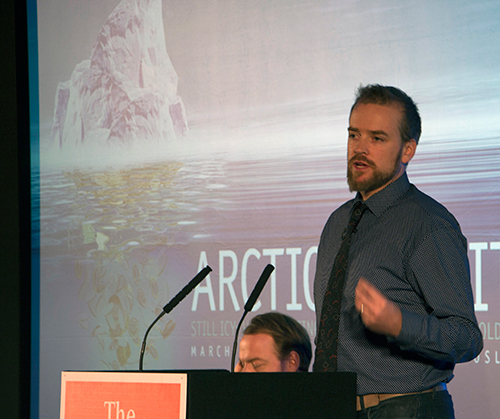 At last week’s Arctic Summit in Oslo, put on by The Economist magazine, the atmosphere was sober.
At last week’s Arctic Summit in Oslo, put on by The Economist magazine, the atmosphere was sober.
Dark Snow Project founder Dr. Jason Box was the only scientist on the agenda, his presentation subtitled “A Warning.”
After a morning of presentations crafted to put a positive spin on the realization that an Arctic oil, minerals, and shipping Bonanza was not as imminent as once hoped, Dr. Box captured the attention of the assembled ministers, magnates, and academics. The whole room seemed to lean closer with each ever-more-ominous graph.
Climate change was a constant gorilla in the room, but there was another one, a bigger one, even more frightening to many of the players, — the creeping idea that energy prices, oil prices in particular, might have gone off script, and no one quite knows if they are going to behave anymore as in the past.
There was agreement that energy development in the arctic is dormant for now due not only to oil prices, but to the recognition that the engineering and logistical barriers are far more difficult than imagined a few years ago. Shipping as well is under a cloud, not least because of questions about Russian intentions and behavior.
It’s not getting any more predictable up there.
A fall in oil prices may help long-term exploitation of fossil fuels in the Arctic by averting a short-lived “gold rush” into the vulnerable icy region, Norway’s Foreign Minister Boerge Brende said on Thursday.
Exploitation of oil and gas required long planning to safeguard the fragile environment, which is heating up faster than the world average because of global warming, he said.
“It is safe to assume that Arctic gas will have its day,” he said in a speech at an Arctic conference, saying that burning natural gas emitted half the amount of heat-trapping carbon dioxide as coal.
Brende said some projections for an opening of the Arctic to shipping, oil and gas exploration and mining had been too optimistic amid a thaw that has cut the extent of winter sea ice on the Arctic Ocean close to a record low this month.
“We should be very happy that there was not a ‘gold rush,’ ” he told reporters in Oslo. “A ‘gold rush’ is not positive, it’s throwing oneself at resources at breakneck speed.”
“The Arctic is a very vulnerable area where we have to go step by step” with strong environmental rules, he said.
Still, he said that fossil fuels would continue to dominate the world’s energy mix and would be needed from more Arctic areas.
Statoil’s Snoehvit gas field, in the Barents Sea, is so far Norway’s only Arctic offshore field. Eni’s Goaliat field is due to start producing oil in mid-2015.
Brent oil futures traded at $58 a barrel on Thursday, slightly more than half its average of around $110 from 2011-13. The fall has discouraged investments in the high-cost Arctic.
Meanwhile, at yet another conference on the future of the Arctic, the same week, a more euphoric “Chamber of Commerce” atmosphere prevailed.
ROVANIEMI, Finland—In one of this nation’s northernmost cities and at the close of a winter that citizens here have called unusually mild, foreign ambassadors spoke of their nations’ hope to do business in the Arctic, Finnish spokesmen outlined their plans to attract international money, and business owners burnished their cases for investment in the polar north.
“Nordic lights is a good example of business actually nowadays,” Juha Mäkimattila, the chairman of the Lapland Chamber of Conference, said at a dinner for foreign guests, Wednesday, with a slideshow of aurora borealis photographs thrumming behind him. “We can actually make money on the northern lights from people from new parts of the world.”
At the two-day Arctic Business Forum, hosted by the Lapland chamber, delegations from more than 20 nations, most which do not border the Arctic Circle, said the tone reflected a robust appetite for economic expansion, natural resource extraction and an optimistic prognosis for strong tourist spending.
Meeting in a city that advertises itself on its website as “The Official Hometown of Santa Claus,” most speakers alluded to environmental management but didn’t get into the problems of melting permafrost or the additional threats of future oil spills or the loss of species.
On both days, the tone was bullish. Diplomats from global trade and economic powers signaled their governments’ growing interest in Arctic transit and heavy shipping in the Arctic Ocean.http://climatecrocks.com/2015/03/16/a-tale-of-two-arctics/







No comments:
Post a Comment